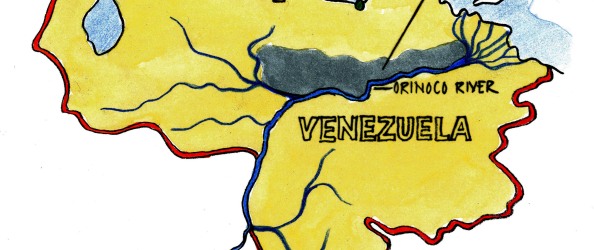
The illustration is from the book Peeking at Peak Oil.
Since OPEC decided in November 2014 against reducing the supply of oil on the world market by decreasing production and so force up the price, international headlines have mainly addressed the topics of Saudi Arabia’s oil production behaviour, Russia’s economic problems, the slowing Chinese economy and the difficulties that the fracking industry in the USA is encountering. What has not been discussed as much in the media is the painful economic problems being encountered by some OPEC nations. What will happen to some of these nations when their problems exceed the threshold of pain that they can withstand? Venezuela is a member of OPEC and it is becoming apparent that it has reached, or passed, its economic pain threshold.
Venezuela is completely dependent on trade income from oil exports. It is also probably the world’s oldest oil-exporting nation. When the land was conquered by the Spanish, the local people were already using the crude oil and asphalt that seeped out of ground there. The thick black fluid, known to the local people as “mene”, was used mainly for medical purposes, as a fuel for illumination and in the waterproofing of their canoes. The first documented export of oil from Venezuela was in 1539 when a single barrel of oil was shipped to Spain to alleviate the gout of the Holy Roman Emperor Charles V.
But let’s turn away from history to look at how the recent dramatic decline in the price of oil is affecting Venezuela and promoting the probable collapse of its oil industry. At every OPEC meeting Venezuela has tried to convince the others that OPEC should reduce its oil production but Saudi Arabia’s influence has been too great. Now Venezuela is desperate and is attempting to assemble a united opposition to Saudi Arabia. During the past week Venezuela’s oil minister has visited Iraq, Iran, Qatar, Algeria, Nigeria and Russia with the purpose of convincing them to reduce oil production.
Paradoxically, the BP Statistical Review of World Energy states that Venezuela has the world’s largest oil reserves at 298 billion barrels. This is 18% of the world’s total oil reserves. Venezuela’s reserves are even larger than those reported for Saudi Arabia. Based on this knowledge it is relevant to ask why Venezuela has such great economic problems despite possession of these gigantic oil reserves. (The subsequent question that should come to mind is whether there is something misleading about Venezuela’s oil reserve numbers.)
Venezuela’s conventional oil fields are old and in that phase of their exploitation where production is in decline. Also, 80% of Venezuela’s oil production is among the world’s dirtiest, heaviest and most expensive to produce.
To convince Saudi Arabia to reduce its production while maintaining Venezuelan oil exports to the USA can be problematic since Saudi Arabia has lost market share in the USA. A large proportion of the refineries along the coat of the Gulf of Mexico are adapted to handing the heavy oil from Venezuela. However at the moment Venezuelan oil exports to the USA are experiencing competition from Canada’s oil sands that produce a product of similar quality to Venezuelan oil. If the price of oil continues to be low, Venezuela’s entire oil industry may collapse and, with it, that nation’s economy.
Most of Venezuela’s oil reserves are within an oil field known as the Orinoco belt. It is the world’s largest oilfield. If Venezuela’s geological conditions had been somewhat different Venezuela could have been today’s Middle East. Orinoco belt oil is profitable to produce when the oil price is high but under the current price regime oil is being produced at a loss. However, to not produce any oil at all would be a greater loss to Venezuela.
The reserves of heavy oil of Venezuela and Canada combined make up about 400 billion barrels which is approximately one quarter of the world’s reported oil reserves of 1,700 billion barrels. Like Venezuela’s heavy oil production, oil production from Canada’s oil sands is also experiencing difficulties with profitability. Considering December’s climate treaty agreed in Paris it would actually be a good thing for heavy oil production to collapse and for that oil to remain underground.
Many are not aware that while around 25% of the world’s reported oil reserves exist in two nations, Canada and Venezuela, it is these two nations that are the greatest threat in terms of future carbon dioxide emissions from oil. Currently this 25% of world oil reserves accounts for only 2.5% of world oil production. As conventional oil production declines, the International Energy Agency (IEA) anticipates that production of heavy oil will increase in importance (and increase in rate). If the world’s nations are serious about their commitments to reduce carbon dioxide production as was applauded in Paris, then one of the first measures they should take would be to conclude a treaty with Venezuela and Canada on the conditions for an end to their heavy oil production in the Orinoco belt and the province of Alberta respectively. That would be a fantastic decision for reducing global emissions of carbon dioxide.

Swiss Coaching Partners
April 3, 2016
Reblogged this on Swiss Coaching Partners.